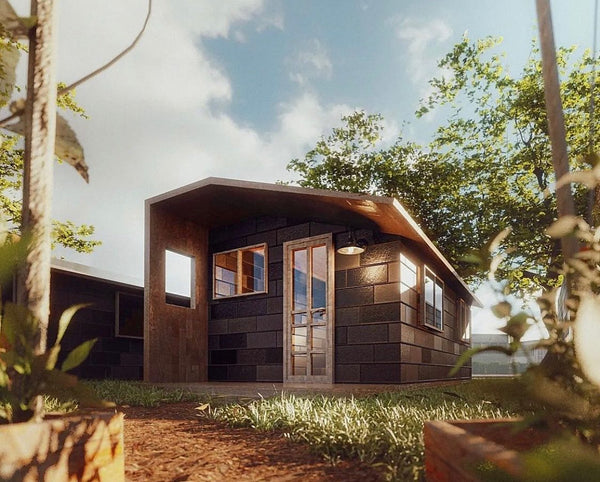
OLFA Supports Building Sustainable Shelters
Sustainability has become increasingly important in consumers’ purchasing decisions in recent years. Consumers now see themselves, along with their chosen brands, as the primary catalysts for change. That’s why here at OLFA, we not only embrace sustainable practices in our manufacturing process, but we also support those individuals that want to make a difference in the world.
This is how we met Josh Griffin (@jgriffin_), a passionate young man from Winnipeg, Canada. While living in Bali for a few years, he saw the tragedy of plastic waste. He says: “Every day in wet season, the beaches would be completely covered in plastics. As far out into the ocean as you could see, plastics were floating around. People in Bali are some of the most hard-working individuals I’ve ever met, but they also live in some of the most extreme conditions you could ever imagine”. After moving back to Canada, Josh realized the homeless situation had significantly worsened since he left. He knew he had to do something about it.

That’s when he came across Precious Plastics. Founded in the Netherlands in 2013 by Dave Hakkens, Precious Plastics is an alternative plastic recycling system. Because of what Josh had experienced in Bali, he knew there was a lot of potential in turning plastics into building materials. As more and more architects and countries started using this innovative material for building, Josh felt he could follow that lead. Josh uses this material to create small shelters for the less fortunate (@temporaryhomelessshelters).
The Project
“The possibilities of using recyclable plastics are endless” said Josh. Everything from the interior to the exterior walls can be made from 100% recycled plastics. These structures can be set up temporarily at designated locations. But building sustainable shelters with recycled plastic goes beyond sustainability. It can provide opportunities for employment while teaching people new skills. Bonus advantages while cleaning up plastics from around the world.
Josh said he’s been very lucky, as “Many communities all over the world have helped spread the word about my project. This includes companies like OLFA who have volunteered to help by sending some of their tools that I can now use every day. From cutting plastics to removing the labels, they have made the process a breeze.”

Tools featured:
- OLFA 25mm XH-AL Fiberglass-Reinforced Auto-Lock Utility Knife
- OLFA SK-15/10 Disposable Concealed Blade Safety Knife
Josh has created different prototypes already, testing the different plastics and additives to find the perfect combination. When additives are added to plastics, they can make them stronger and more durable than concrete, wood, or metal. For this project, Josh is using HDPE#2 plastic, a very high-quality, durable thermoplastic. This type of plastic is also not harmful, as it doesn’t release any toxic fumes when heated or melted. Most examples of these plastics are found in our everyday lives: bottle caps, shampoo/conditioner bottles, cosmetic containers, laundry detergent bottles, bleach and other cleaning agent bottles, yogurt drink bottles, and more.

Because of the manufacturing process and materials used, the bricks and beams of the shelters will be fire retardant, UV resistant, and water and chemical resistant. They will also have very good insulation properties, as well as being nearly maintenance-free.
But collecting plastics isn’t all that simple. Josh has been networking for several months. He put up posters in his town and shared his story on social media. This helps him gain the traction needed from companies and communities to donate plastics. The Pepsi Factory and some hospitals in Winnipeg have been the largest donors. He hopes that more people will continue to join.
By helping him spread his mission, OLFA hopes this project becomes successful not only in Winnipeg, but also across the country. If he’s able to succeed, Josh’s ultimate dream would be to “spend half the year in Canada doing this, and the other half in Bali doing the same. He would also like to travel to other third-world countries and teach this process to others. There are so many great things that can be done with this unique material”.
To support Josh’s project, please donate to his GoFundMe here.


